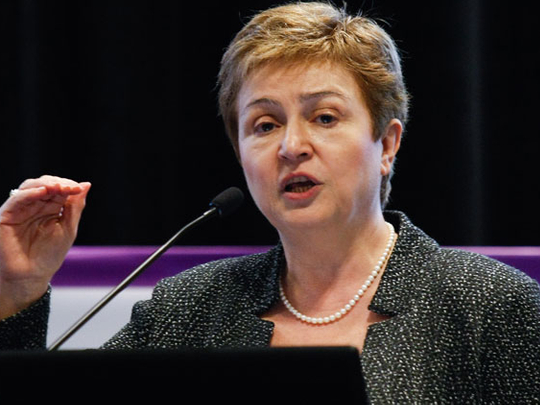
Dubai: The Syrian crisis is expected to lead to the world’s largest refugee crisis surpassing Afghanistan, which has had the highest number of refugees for the past two decades, a senior European Union said on Tuesday.
Speaking to Gulf News, Kristalina Georgieva, European Commissioner For International Cooperation, Humanitarian Aid and Crisis Response, said the conflict, which has been going on for three years now, has affected “ten million people inside Syria, 6.5 million are displaced inside Syria and there are already 2.5 million [Syrian] refugees.”
“As we speak, it is very possible they [Syrians] will cross the 2.7 million mark [the number of Afghan refugees],” she added in the interview during her participation in an international meeting focusing on humanitarian issues and women and aid.
The major concern about the Syrian crisis is that it “dramatically affects the civilian’ population. This is the worst crisis of our times. Women and children are the most vulnerable not only inside the country, but also as refugees,” Georgieva said.
Almost 5.5 million children have been affected by the Syrian crisis, 1.2 million of whom are refugees. And women, usually, bear the brunt of the agony, she said. They take care not only of themselves, but also their children and elderly relatives.
“I think it is the most dramatic part [for women refugees] to be helpless when they see their children affected.”
Being in a “foreign environment” in refugee camps outside their homeland has led to many Syrian girls marrying at the age of 13 and 14, she said.
Previous achievements by Syria in terms of literacy are threatened by the fact that many young children are not going to school.
“We have problems for women today, but we also have a very serious problem of women of Syria of tomorrow,” Georgieva said.
Bigger problem
Syrian refugees are part of a bigger problem where nearly 46 million people are either refugees or displaced around the world. Among the displaced, nearly 75 per cent are women and children.
Men during crisis and conflicts seek work in other places, or engage in fighting. Some may see their families occasionally but others abandon them, mainly during long-lasting crisis, she said.
Women, on the other hand, are left to take responsibility and protect their family. And this makes women “victims as well as heroes,” she said.
The Dubai meeting looked at the problems and dangers facing women and what can be done to give “women a chance to help themselves. Is it by giving them cash? Or access to jobs? Or training and protection?”
Many donor countries, including the European Union, are introducing very specific policies to support women and build their capacities, she added.








